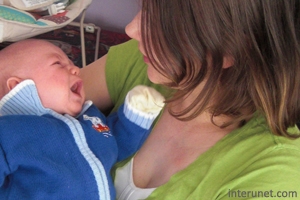
Babies can cry because of many reasons and parents have to guess which one it is and react on that in order to sooth their child. Your baby can be hungry or he/she may need the diaper to be changed. These are the most frequent and easiest reasons to guess for parents why their baby might cry. Other reasons are harder to determine and therefore eliminate or sometimes impossible. Pediatricians say that some amount of crying is normally ok in all infants because they not able to speak and tell you what bother them yet. Therefore, you shouldn’t be frustrated too much when your baby cries since it is his/her only way of verbal communication until about three months of age. You should, however, learn how to distinguish the difference between baby’s cries in order to prevent excessive cry which may hurt your child’s health.
Some other reasons why your infant may cry are:
- child needs to be burped while feeding
- he/she might have gas in his/her tummy (colic)
- want to get what they want
- he/she might be scared because of sudden and unfamiliar noise or shout
- baby is lonely, too warm or cold, uncomfortable, tired, overstimulated, want to move, want to suck, and/or want to be cuddled
- pediatricians indicate that sometimes babies are frustrated because they don’t want to be and act as babies, they like to do things but they are not yet capable to
- many babies go through periods of crying for no apparent reason (just certain time of day or night)
What to do to prevent your babies cry
If you see that your baby acts as he/she is hungry (symptoms: he/she might cry, open his/her mouse and turn on side, start sucking fingers) you need to just feed your child no matter that it might be earlier than 3 hours between meals. When you feed try to burp your new born every 5 minutes or at least when you change breasts. If your baby cries it can cause gulping air into his/her digestive system resulting in forming some gas resulting in crying for a longer time. So, you shouldn’t leave your infant to cry it out for long time because it can hurt him/her more than do any good. Parents will not spoil their children by soothing them in the early stage of their lives, but teach them how to calm down themselves in the future. Approximately in the first three months of life, newborns don’t know how to calm themselves down. Self-calming skills develop over time with parents help.
If your new born is tired or overstimulated, he/she needs to be left alone to rest or sleep for a while. Allowing your infant to have quiet and uninterrupted sleep might help with tiredness, decrease irritability and some extra crying for a day. On the other hand, he/she can be lonely and want to see and be with his/her parents. You can put you child in a baby bouncer or baby play yard and take him/her in the room you do your chores or other activities. Don’t forget to check your baby’s diaper frequently in order to avoid butt redness and cry because of that. You can try everything to calm you child down, however, if your infant cries too long (more than 4 hours) or has unusual behavior you should contact your pediatrician or call an emergency in the worst case scenario.
Medical Disclaimer
The author is not a doctor and the information in the article is general in nature with no medical advises given or imply. Talk to your doctor, nurse or medical advisor how to treat health related problems.
